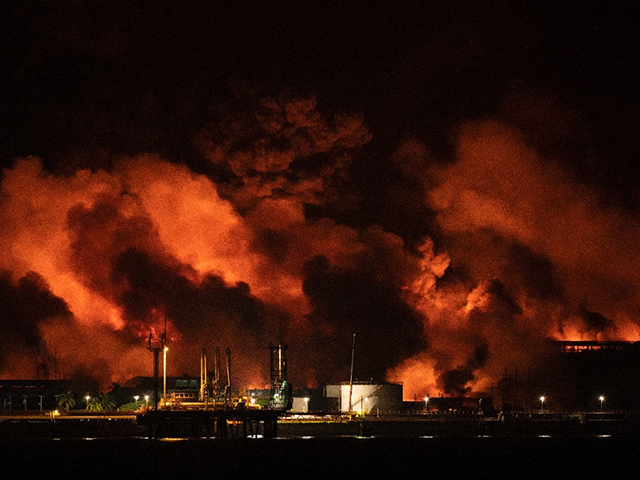Chinese dictator Xi Jinping contacted his communist counterpart, figurehead Cuban “president” Miguel Díaz-Canel, on Monday to lend support in the face of a massive oil tank fire at a facility in northern Matanzas that has been raging since Friday.
Matanzas is home to Cuba’s largest fuel depot; the destruction of a significant percentage of the nation’s oil supply has already begun to intensify already-dire blackouts and gasoline shortages nationwide, Cubans on the island have documented. In the face of Communist Party emergency personnel failing to put out the fire – it is still raging at press time – Matanzas, a city of about 140,000, remains under a toxic black cloud, prompting residents to flee as the Party offers no information on safety measures for locals to take. In Havana, about 55 miles away, a black cloud began approaching on Monday, darkening the capital and resembling storm clouds.
Más videos desde la zona de #Matanzas. Me dicen los vecinos que se está viendo más humo blanco. Una buena señal. Bendito sea Dios. https://t.co/MRDvya7JEb pic.twitter.com/gGpM3aD8J8
— Mario J. Pentón (@MarioJPenton) August 9, 2022
Communist Party officials claim the fire began when lightning struck one of the oil storage tanks on site. They have not offered any clear explanation for why the fire continues to rage. Havana has accepted aid from the leftist governments of Mexico and Venezuela to help put out the fire and acknowledged that the United States offered assistance if requested.
Cuba is a member of China’s Belt and Road Initiative (BRI), a global program in which China offers to build advanced infrastructure in poor countries by ensnaring their governments with predatory loans, then seizing the assets built when the countries cannot pay. The construction of a state-of-the-art fuel storage facility could be a lucrative project for Beijing on the island if the Castro regime allows it.
China’s Global Times propaganda outlet reported on Monday that Xi personally sent “condolences” over the over 100 injured and at least two deaths caused by the fire to Díaz-Canel.
“In his message to Diaz-Canel, also first secretary of the Communist Party of Cuba Central Committee, Xi said he was shocked to learn about the fuel farm explosions in Matanzas province in Cuba, which caused serious casualties and property losses,” the Times replayed.
The Chinese Foreign Ministry confirmed on Monday that Beijing would “stand ready” to send aid to Cuba when requested to put out the fire and rebuild.
“China and Cuba are good friends, good comrades and good brothers. We express our sorrow and condolences for the loss of life in the accident and extend sympathies to the bereaved families and the injured,” Foreign Ministry spokesman Wang Wenbin told reporters. “The Red Cross Society of China has decided to offer emergency humanitarian assistance to the Red Cross Society of Cuba. We stand ready to provide the Cuban side with further assistance.”
Cuba signed an energy-specific BRI pact with China in 2021 as part of its greater participation in the debt trap scheme, potentially expanding China’s opportunities to rebuild in the face of the disaster. At the time, Cuba’s ambassador to Beijing, Carlos Miguel Pereira, said the energy agreement would help in “amplifying and diversifying energy cooperation and collectively overcoming challenges [of] global energy development.” Both sides claimed the major projects in the “Energy Alliance” would focus on renewable sources of energy, not fossil fuels, though state newspaper Granma listed “inclusive access to energy services” among the projects China would help with, without specifying energy from only “green” sources.
The restoration of Matanzas is likely a long-term project, as last week’s fire continues to rage at press time. The Communist Party evacuated 4,000 people in the immediate aftermath of the first explosion at the site. As of Monday, three oil storage tanks had collapsed entirely; the latest explosion at the site occurred on Monday afternoon, making it nearly impossible for firefighters on foot to address the situation.
Terribles imágenes nos llegan desde Matanzas donde se acaba de sufrir una nueva explosión pic.twitter.com/4pMeN2q34l
— Mario J. Pentón (@MarioJPenton) August 8, 2022
By Tuesday, Cuban Communist Party officials were claiming that only “white smoke” was billowing out of the storage facility, indicating that the fire had stopped smoldering, from at least one of the tanks.
Party officials confirmed that Washington had reached out to offer “technical consulting” and, in a rare statement towards America lacking belligerence, a top External Affairs Minister said Cuba “profounding appreciates condolences and expressions of help from diverse organizations and people in the U.S.”
The State Department confirmed that it was “carefully monitoring” the fire, about 100 miles from the United States, and that it had offered Havana aid but that the Communist Party had not requested America’s help. Instead, a little more than 100 firefighters and other technical personnel from allied Venezuela and Mexico arrived this week to help stop the fire, according to the Global Times.
#BREAKING: National Security Council spokesperson tells @WPLGLocal10 the U.S. government has had general discussions with #Cuban govt on #Matanzas disaster. BUT Cuban govt has NOT formally requested U.S. govt assistance. STORY: https://t.co/GuPsZmopgK #CUBA pic.twitter.com/iCpdKJv8ab
— Hatzel Vela (@HatzelVelaWPLG) August 9, 2022
The Castro regime has identified two men at press time as deadly victims of the fire, a 60-year-old firefighter named Juan Carlos Santana Garrido and a 20-year-old first responder, serving as a firefighter as part of his mandatory military service, named Michel Rodríguez Román.
Residents of the larger Matanzas province have begun to flee their homes even in areas outside of government mandated evacuation.
“The information that is getting here is very scarce, we don’t know what can happen,” a young man fleeing identified as Jancel Moreno said in a widely circulating social media post from Matanzas. “We don’t know what is going to happen, there is a lot of fear in the whole city. We are trying to get away as much as possible. The only thing on television is disgusting triumphalism.”
Local Party officials are denying widespread evacuations and urging locals to wear sanitary masks to protect from toxic fumes, according to the Argentine news network Infobae.
Outside of Matanzas, in neighboring Havana, eyewitnesses told the Cuban independent news outlet 14 y Medio that the signs of ecological devastation from the fire had already become overt. Locals said that, following rain on Sunday, “viscous puddles, with a smell of burnt gasoline,” clung to the ground and sullied the outer walls of buildings.


COMMENTS
Please let us know if you're having issues with commenting.